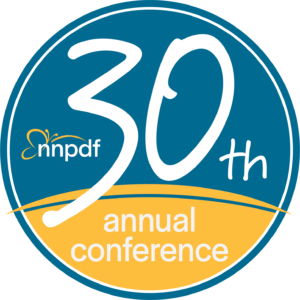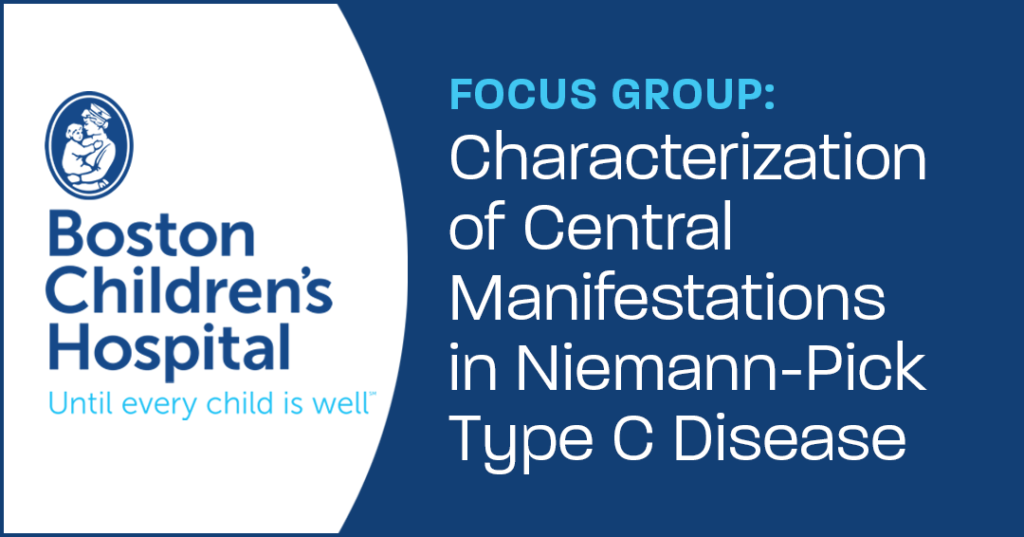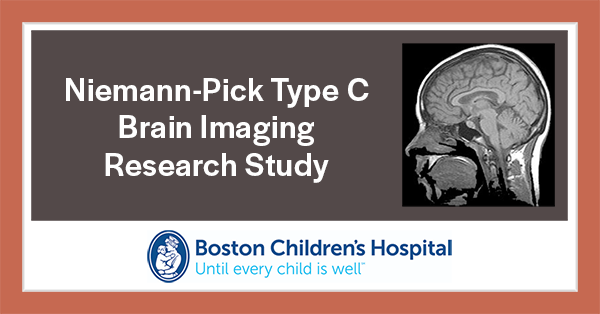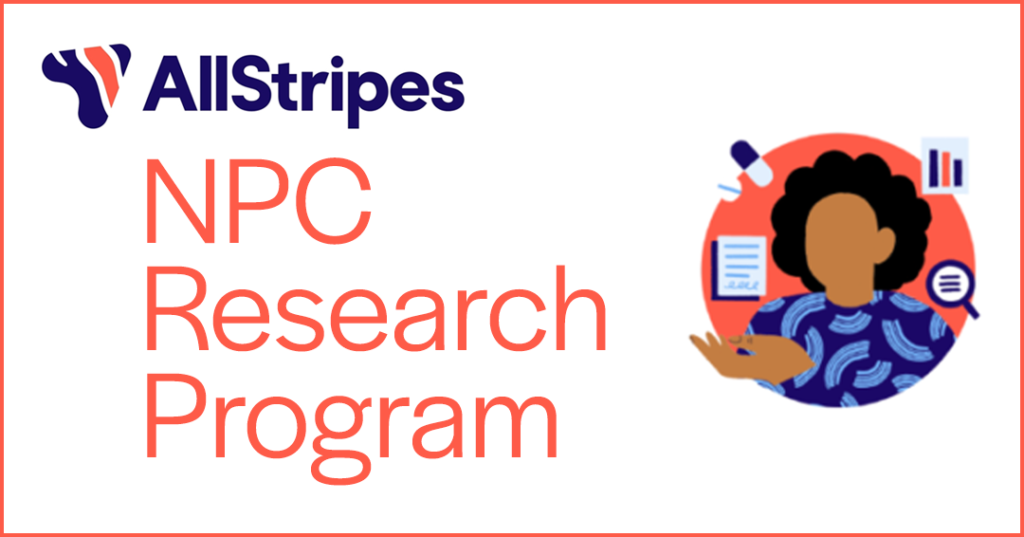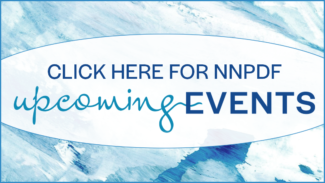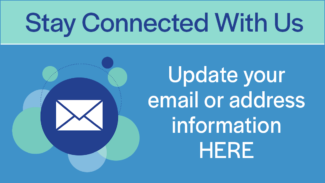April 2022 Newsletter
Message from Executive Director | 2022 Family Support & Medical Conference
Family Advisory Working Groups | Family Conference Scholarships
Joele Ruppert & Joseph Colton ASMD Scholarship | NNPDF Cora Sterling Endurance Award
NNPDF Research Fellowship Applications | INPDA – ASMD Survey Webinar
Community Update Webinar Series with Sanofi – Recording | In the Spotlight | Adult Onset NPC
NPC Spotlight Web Resource | Newborn Screening Update | Fundraising
Surveys & Studies | Clinical Trial Updates | Duke-Margolis NPC Public Workshop Update
Membership | Emergency Hardship Program | Upcoming Events
Message from the Executive Director
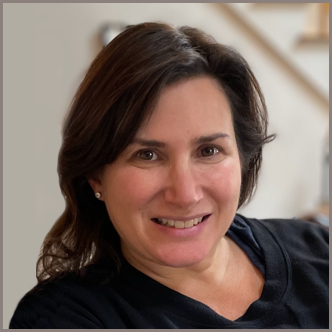 Dear NNPDF Community,
Dear NNPDF Community,
Excitement is building for our 30th anniversary Family Support & Medical Conference! From July 28th – 30th, we’ll once again gather IN-PERSON (!!) in Orlando to share, learn, support, and be together as a Niemann-Pick community. We’ve seen over the past two years that virtual conferences are possible, and effective, but nothing can replicate the essence and importance of being together in real life.
Among all the many challenges and changes introduced by the COVID pandemic, some seem likely to linger, possibly for years. In the Niemann-Pick disease community, as in many other rare disease communities, it will be essential for us to continually monitor these changes to assess how they might affect patients, caregivers, families and others. And one of these challenges – scheduling events where patients and families can meet in person – is high on the list of factors we must consider in this new world in which we are now living.
Meeting in person has potential benefits in any sort of social or business setting. It is easier to share information (without Zoom fatigue) and have side conversations. It is also just more fun. But it has a special meaning in the Niemann-Pick community. Many will remember a time when it was difficult for patients and families with rare diseases to even find each other. There are so many stories of families who lived with NPD for years before they had a chance to meet someone who really understood what they were experiencing. And when they were eventually able to connect in person, the experience was often transformational. Suddenly there was a stronger sense of community. There was support – even if it was just words of encouragement – from someone who really “gets it” about living with a disease.
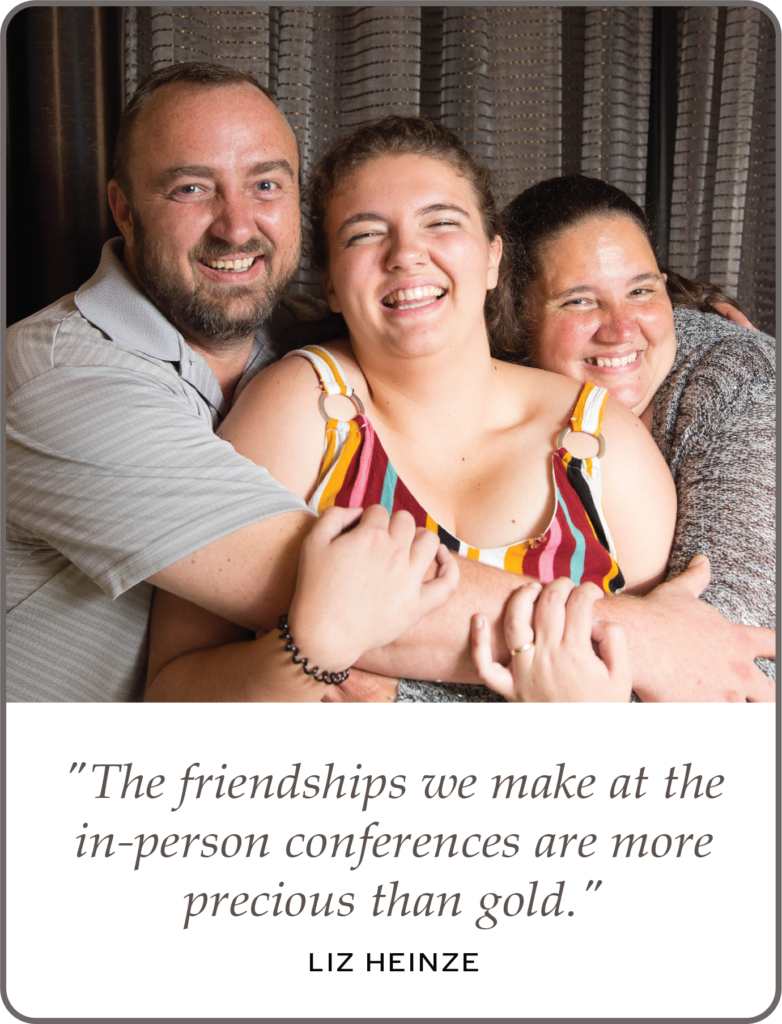 As Liz Heinze, mom to Katie, Tyler, and Faith, all of whom passed from NPC, and daughter Serina who is an active leader of the Niemann-Pick sibling community, explains “the first conference was a game changer not only for my husband and I to meet other parents, but for our children to meet other kids with the same illness. And, most helpful for our healthy daughter to make friends with other siblings. The friendships we make at the in-person conferences are more precious than gold. We look forward to seeing our Niemann-Pick family each year.”
As Liz Heinze, mom to Katie, Tyler, and Faith, all of whom passed from NPC, and daughter Serina who is an active leader of the Niemann-Pick sibling community, explains “the first conference was a game changer not only for my husband and I to meet other parents, but for our children to meet other kids with the same illness. And, most helpful for our healthy daughter to make friends with other siblings. The friendships we make at the in-person conferences are more precious than gold. We look forward to seeing our Niemann-Pick family each year.”
In effort to provide support for individuals and families affected by Niemann-Pick disease, the NNPDF has for many years made opportunities to bring patients and families together a top priority, and our Annual Family Conference has been the largest gathering of people living with Niemann-Pick disease in the US. For 30 years, we have watched as children have met and played with other children, parents shared hugs and coping strategies, families were able to interact together with medical experts. And the Conference got bigger every year – because families experienced firsthand the benefits of meeting in-person and they wanted more.
And then COVID came. We rapidly had to find new models to foster connection. Zoom was the default, the goal was to make sure we did not lose the sense of community that joining together brings to so many families. It sufficed in this unique pandemic situation. There was no need to travel – or even dress up—and programs allowed people to easily drop in for shorter or longer periods depending on their schedules. But most people agreed that meeting in person – the ability for one-to-one conversations, spontaneous exchanges, and sharing meals – is the best way to build and strengthen the NPD community. Virtual connection worked, but the essence and importance of in-person connection was lost.
Fast forward to our new world. Some families are eager and ready to jump back to in-person gatherings and some are still hesitant. We are working to figure out the best options when it comes to staying connected, including hybrid models like our virtual conference option.
As we consider all these factors, NNPDF keeps its goal on allowing our families to stay connected and positioned to provide the levels of support and engagement that our families need.
In many ways, nothing is better than being able to meet in person – even just once a year or once in a while. Our conference promises to be dynamic and interactive, it will strengthen community ties and give participants value – in terms of emotional support, learning opportunities, and chances to connect with others. As we plan for the future, NNPDF will continue to work to make sure that we bring you the very best opportunities for friends and families to join together to help us plan for a better future for everyone affected by Niemann-Pick disease. I look forward to seeing you there.
Best wishes,
![]()
Joslyn Crowe, MSW, MA
NNPDF Executive Director

DEADLINES APPROACHING!
NNPDF Family Advisory Working Groups
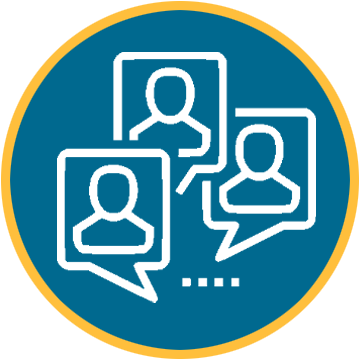 The NNPDF will host Family Advisory Working Groups on Thursday, July 28, 2022 from 1:00 pm – 4:00 pm EST at the Wyndham Grand Hotel in Orlando prior to the start of our Family Support & Medical Conference. Pre-registration is required.
The NNPDF will host Family Advisory Working Groups on Thursday, July 28, 2022 from 1:00 pm – 4:00 pm EST at the Wyndham Grand Hotel in Orlando prior to the start of our Family Support & Medical Conference. Pre-registration is required.
Family Advisory Working Groups will provide Industry partners the opportunity to connect privately with a group of 6-10 NPC or ASMD patients and/or immediate family members for a 3-hour session. Groups are limited to 2 adult participants per family, living in the U.S.
Participants are eligible for a $350 stipend per participant and 1-night hotel (night of July 27th) included per family. Application deadline is May 16th.
Family Conference Scholarships
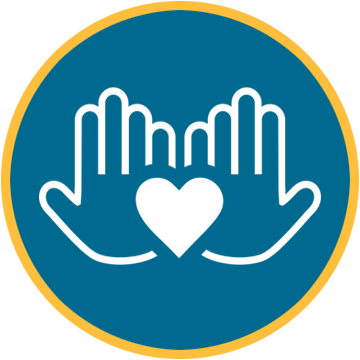 NNPDF Family Conference Scholarship assistance is available to help NNPDF families (living in the U.S.) offset the cost of attending the 2022 NNPDF Family Support and Medical Conference. Scholarships are limited to the immediate family members of an individual with NPD.
NNPDF Family Conference Scholarship assistance is available to help NNPDF families (living in the U.S.) offset the cost of attending the 2022 NNPDF Family Support and Medical Conference. Scholarships are limited to the immediate family members of an individual with NPD.
The NNPDF Family Conference Scholarship will provide up to three (3) nights hotel (room and tax only*) to eligible applicants. Application deadline is May 16th.
Joele Ruppert & Joseph Colton ASMD Scholarship
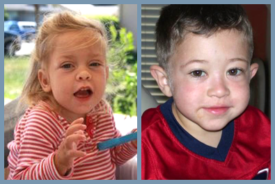
NNPDF is accepting applications for the Joele Ruppert and Joseph Colton ASMD Scholarship created in honor of the lives of these two cherished children (both diagnosed with ASMD) and their parents.
This scholarship provides one-time funding of $500.00 to individuals diagnosed with ASMD for studies in post-secondary (high school) degrees, including two-year colleges, four-year colleges, vocational schools, and other post-secondary institutions.
Read complete story and learn more about this scholarship opportunity. Application deadline is May 16th.
NNPDF Cora Sterling Endurance Award
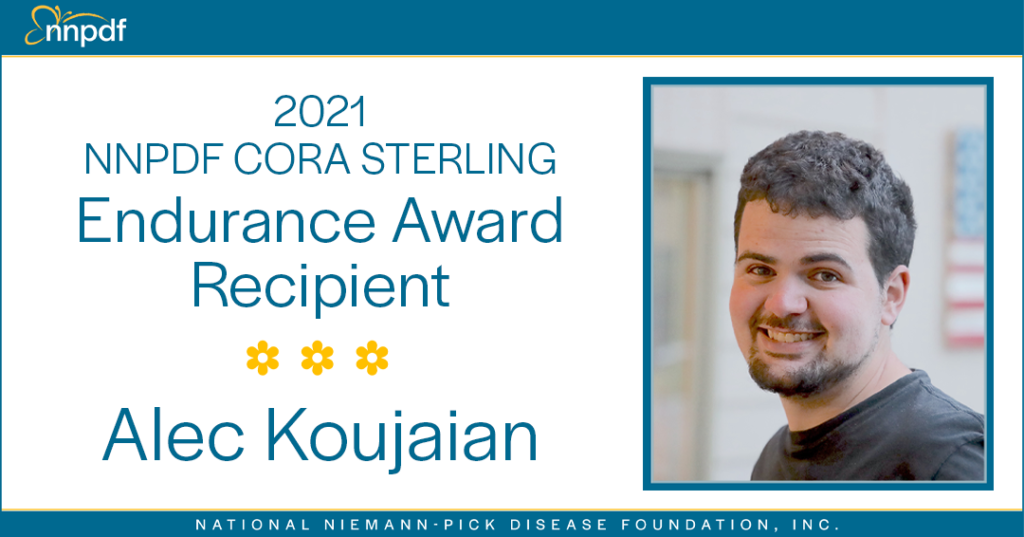 Do you know a great young person who shines for Niemann-Pick awareness? NNPDF is seeking nominations for the NNPDF Cora Sterling Endurance Award. This award is presented annually at the NNPDF Family Support & Medical Conference to a young person (under age 25) who shines in raising awareness of Niemann‐Pick disease in the community. Nomination deadline is May 31st.
Do you know a great young person who shines for Niemann-Pick awareness? NNPDF is seeking nominations for the NNPDF Cora Sterling Endurance Award. This award is presented annually at the NNPDF Family Support & Medical Conference to a young person (under age 25) who shines in raising awareness of Niemann‐Pick disease in the community. Nomination deadline is May 31st.
NNPDF Research Fellowship Applications
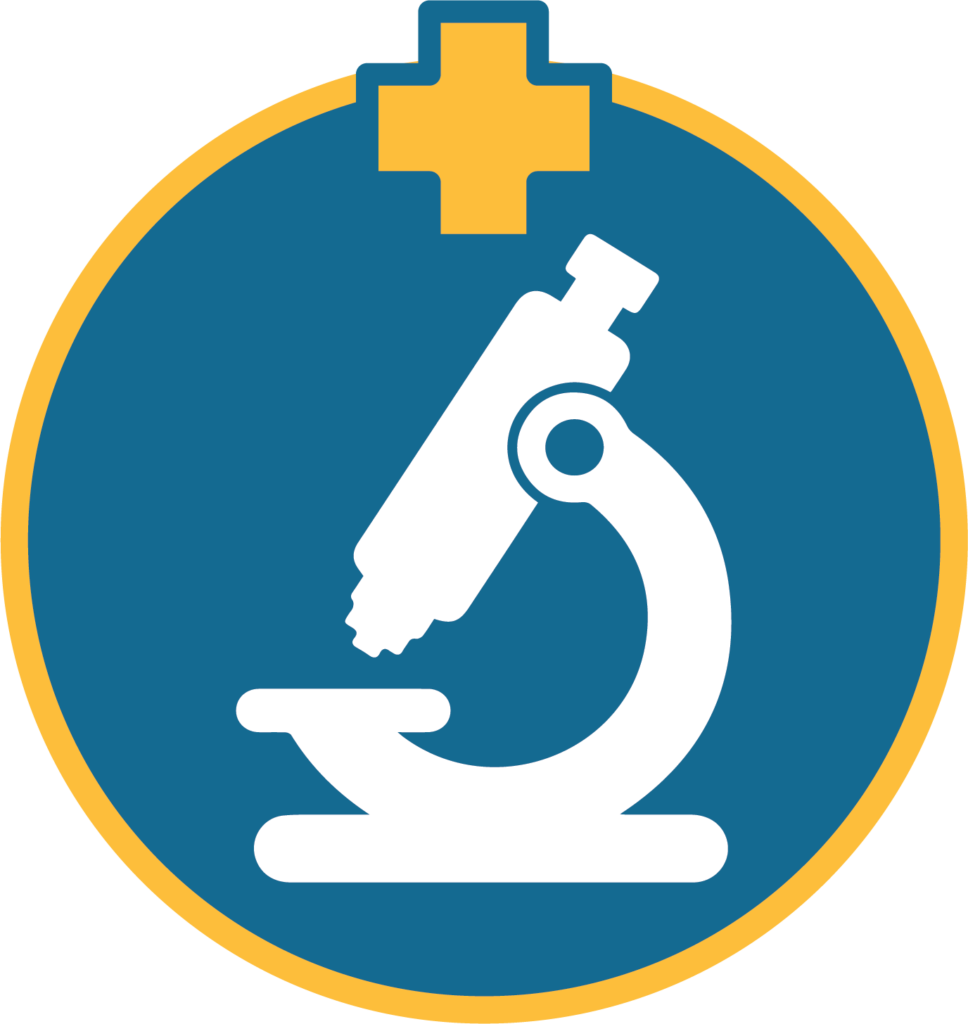
NNPDF is accepting Research Fellowship Applications. The Peter G. Pentchev Niemann-Pick Type C Research Fellowship and the Edward H. Schuchman ASMD Research Fellowship are 1-year awards intended for early-stage researchers. These awards support young scientists in pursuit of independent hypotheses and encourage scholarly development about Niemann-Pick Disease.
Niemann-Pick Disease research is one of the pillars of our mission and we are proud that since 1993, NNPDF has funded 52 grants and 20 fellowships totaling over $4,000,000. Many former grantees and fellows have remained active contributors in the Niemann-Pick Disease space. Contact nnpdf@nnpdf.org with questions. Application deadline is June 1st.
INPDA - ASMD Survey Webinar
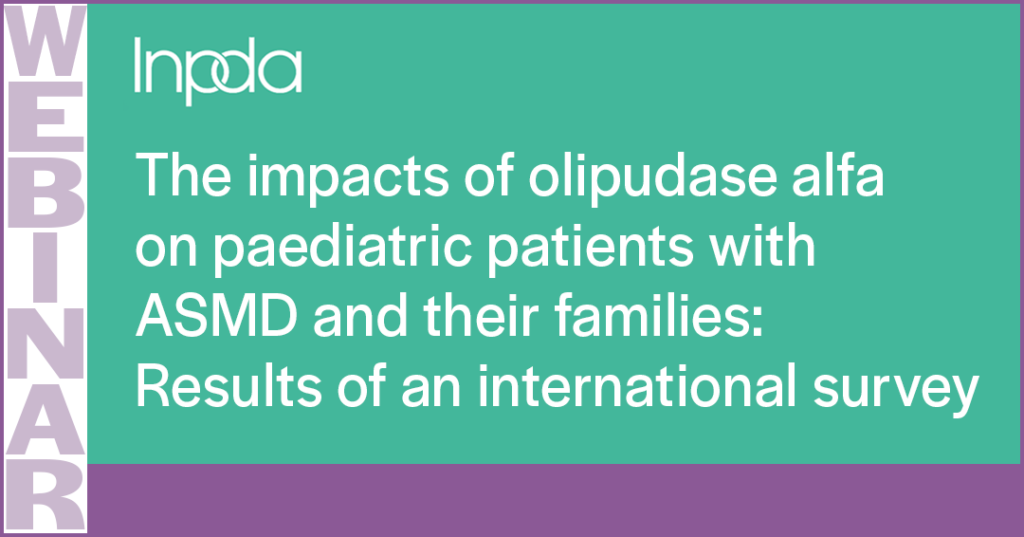 Join the INPDA on Thursday, May 12, 2022 at 1:00pm EST for a webinar where they will be sharing The impacts of olipudase alfa on paediatric patients with ASMD and their families: Results of an international survey.
Join the INPDA on Thursday, May 12, 2022 at 1:00pm EST for a webinar where they will be sharing The impacts of olipudase alfa on paediatric patients with ASMD and their families: Results of an international survey.
Register here in advance for this webinar. After registering, you will receive a confirmation email containing information about joining the webinar.
Community Update Webinar Series with Sanofi - Recording
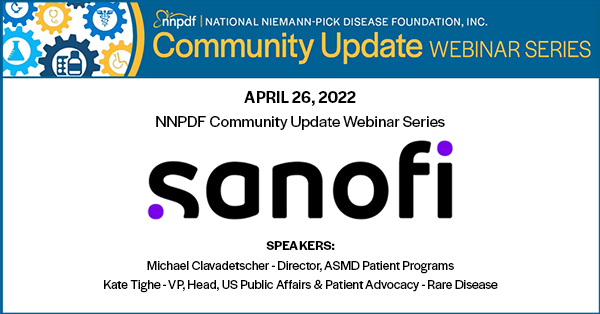 Thank you to all who joined us for the Community Update Webinar Series with Sanofi. Michael Clavadetscher and Kate Tighe of Sanofi discussed Regular Monitoring for Early Symptom Management and ASMD resources available through the Sanofi team. Watch the recording.
Thank you to all who joined us for the Community Update Webinar Series with Sanofi. Michael Clavadetscher and Kate Tighe of Sanofi discussed Regular Monitoring for Early Symptom Management and ASMD resources available through the Sanofi team. Watch the recording.

Pam Andrews
Mom to Belle & Abby, NPC
Firefly Fund, Co-Founder and Executive Director
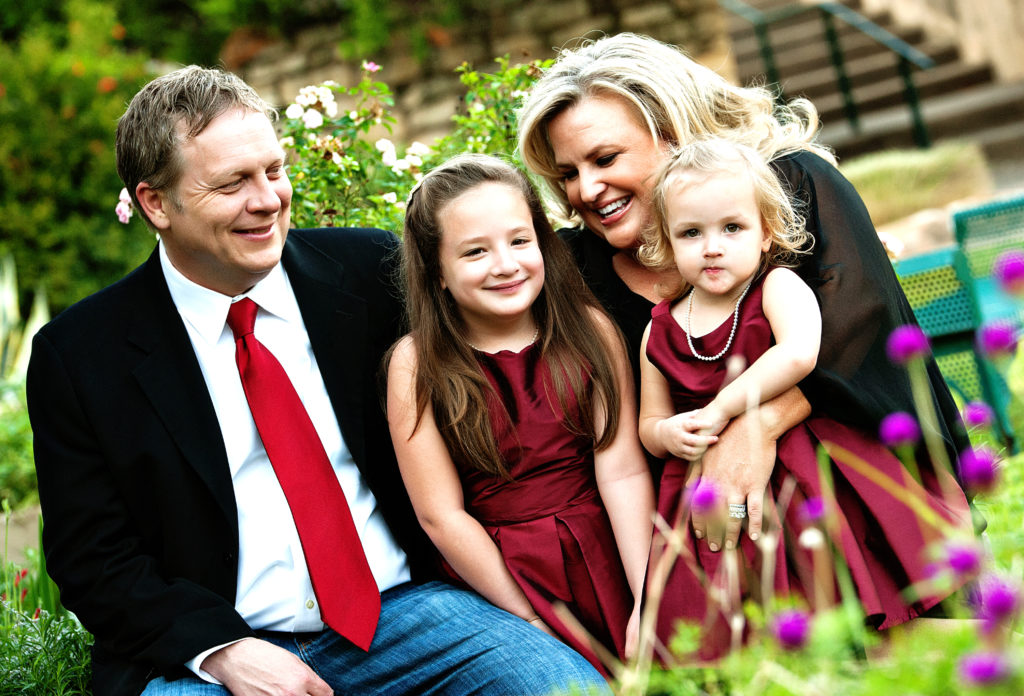 Tell us a bit about yourself.
Tell us a bit about yourself.
My name is Pam Andrews. I’m a sixth generation Texan and was born in a small town just outside of Austin called Brenham, Texas. You may have heard of it before, as it’s the home of Blue Bell Ice Cream. My parents met when in graduate school at the University of Texas at Austin. My mom had just graduated from law school and the only job she could find after graduation (1972), as a new female attorney in Texas, was working as a secretary in a law firm in Brenham, Texas. I have three sisters (Lisa, Jessica and Leslie) and a brother (Sean, who passed away just seven months ago). We didn’t stay in Brenham long and moved back to Austin when I was three years old. Growing up in the 70’s and 80’s was a bit idyllic, to be honest. My siblings and I would play outside with neighborhood friends for 6-8 hours at a time on the weekends. Our bicycles got us around and we walked to and from our neighborhood school during the week. My parents worked hard and a lot and my siblings and I looked after each other. I remember using a kitchen stool to make dinner for my sisters. I wasn’t tall enough to see the top of the stove so I would get a step stool and stand on it and make dinner that way. I was probably seven years old. My grandfather (and great grandfather actually) were both doctors in Ft. Worth, Texas and Alpine, Texas. Truth be told, that was really my only exposure to healthcare or the medical profession when I was growing up. Grandaddy made house calls, delivering babies at home and I remember that he pierced kids’ ears in his office. There was the occasional penicillin shot when someone was sick, but otherwise it was delivering babies and piercing ears. My father, later in my 20’s, was diagnosed with and died from Cancer. I definitely came to understand that people get sick. However, if you had told me in 1978 or even 1994 that I would later have two beautiful daughters who would both be diagnosed with a rare genetic neurodegenerative disease, I would have thought that you were certifiable. As a young girl, I would have never fathomed this life.
I live in Austin with my husband, Chris Andrews, our two beautiful daughters, Belle (12yo) and Abby (7yo) and our two miniature poodles, Lady and Lucy. For fun you will find me taking walks in the neighborhood with my dogs or hanging out in our backyard, by the pool with my girls, and spending time with the little family that Chris and I have made. The girls are filled with joy and laughter and they truly enjoy life and enjoy talking with people in their little lives and they laugh hysterically at each other’s wild antics. They love music and singing and being silly little girls. It is my greatest joy in life, and honor really, to be Belle and Abby’s mama. It is what I enjoy the most in life.
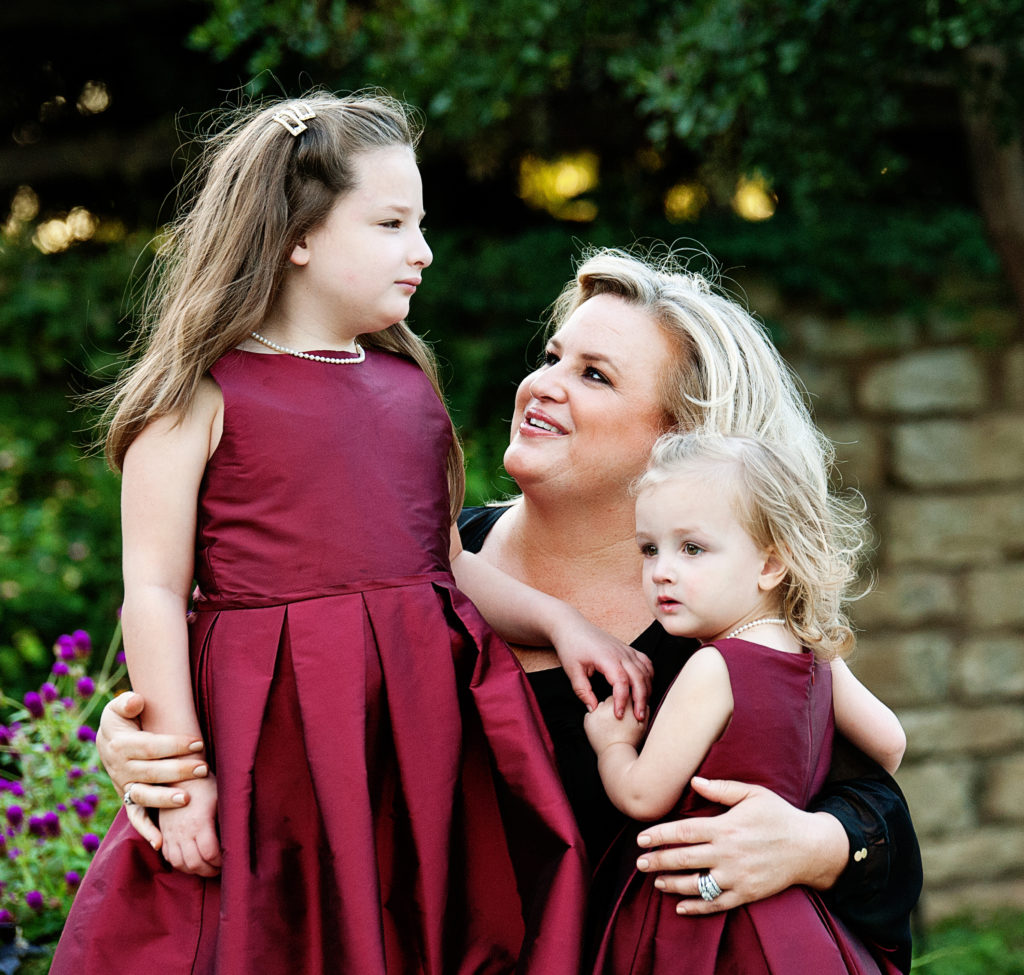 When did you receive Belle and Abby’s diagnosis and what led to this?
When did you receive Belle and Abby’s diagnosis and what led to this?
Belle was diagnosed first after a diagnostic odyssey that spanned several years and included countless appointments with doctors and specialists. Leading up to Belle’s diagnosis what concerned us the most was her tripping and falling, which seemed to be getting worse with each passing day. Belle’s platelets were also always low and her spleen was enlarged. Those were the early signs that kept me tossing and turning at night. And she developed a tremor at about 3yo. For years I was told that she was within the normal range and not to worry. I was a first time mom so I didn’t have a neurotypical child as a reference, but something inside of me kept nudging me to continue pressing for answers. My nieces and nephews and Belle’s friends would come over and I would talk with other moms and no one seemed to have the same types of symptoms that we were seeing.
Finally, we met with a young doctor who was also a mom – she agreed with us that something wasn’t right. Her name is Dr. Amy White and she is now on the BOD of Firefly Fund. Belle was about 4 1/2 at the time and Abby was about 9 months old. Belle’s diagnosis was eventually made through whole exome sequencing. It was suggested that we test Abby immediately, she was 18 months old at the time and had absolutely no reason to believe that she also had NPC. It was terrifying. As you might imagine, our pain more than doubled with Abby’s diagnosis, just 10 days after Belle.
How did you learn about NNPDF?
We learned about the NNPDF really slowly after diagnosis. Initially, the day of our diagnosis, we were given a Make A Wish form and told to take the girls to Disney World and to enjoy them. The doctor made it clear that there were no approved drugs and nothing that could be done. The only information that was given to us was a one pager on NPC and the Make A Wish form. We left the doctors office and made some calls to immediately take steps to form the Firefly Fund. Initially, we thought we were going to have to figure it all out on our own. Over the course of the next few months we had countless calls with NPC families and researchers and clinicians. We were so relieved to learn from some of those early conversations with members from the NPC Community that there was a patient organization and several mature family-led, patient inspired organizations that had been funding research for over 25 years. We began to feel the weight of the girls’ diagnosis lift. We realized that we didn’t have to do this by ourselves.
The NNPDF was in the middle of a transition when we were diagnosed. They were looking for a new leader and for a Board Chair. I think we first met Joslyn and Justin in 2018 and that is when we really began to get to know and work with the NNPDF. It was through the newborn screening work that Firefly Fund does that I began to really understand the significance and importance of a national patient organization in a rare disease community. The NPC Community’s interactions with the healthcare stakeholders like the medical profession, with regulators, with public health officials, with drug developers and companies, all rely on a healthy patient organization. The work that the NNPDF does is vital to the overall success of the NPC Community.
Why is newborn screening important to the Niemann Pick community and what difference can it make in the future?
Newborn Screening is a public health service that reaches 4 million babies born in the United States each year. The newborn screening program ensures that all babies are screened for certain serious life-limiting conditions at birth, and for those babies with the conditions, it allows doctors to start treatment before some of the harmful effects happen. Newborn screening is performed soon after the birth of your baby, and in most cases, while you are still in the hospital. Specific protocols for newborn screening follow up vary from state to state, as does the list of conditions screened for.
It is my opinion that newborn screening is the single most important public health program that exists worldwide. As Belle and Abby’s mom, I understand first hand the horror of watching your child slip through your fingers while searching for answers. The diagnostic odyssey that NPC families are forced to travel is barbaric and unnecessary in 2022. Newborn screening will provide families with information about the health status of their newborn, which will allow for early intervention. We know, and there is consensus among NPC expert clinicians, that early intervention in the NPC patient improves health outcomes. Chris and I live this reality every single day in our home as we watch the trajectory of our two daughters’ lives go in two completely different directions due to the fact that one was diagnosed before any visible signs or symptoms of the disease and one was not.
Shortly after our diagnosis, Chris and I sought out the counsel of someone who has become our dear friend and mentor, Dr. Philip Reilly. At the time in 2016, I’d just finished his book, Orphan: The Quest to Save Children with Rare Genetic Disorders and I wanted to hear his perspective regarding where he thought there were unmet needs in the NPC Community. Dr. Reilly was the first person to encourage us to focus on newborn screening for the NPC community. He wisely explained to us, from the perspective of a venture capitalist mixed with his experience as a clinical geneticist (he has a law degree, as well), that if NPC patients can be identified at birth then what will happen as a result is that NPC patients will have plenty of treatments in no time. He explained that newborn screening for NPC would accelerate the drug development process because we would be helping “them” to help us.
In addition to finding our patients early, newborn screening is important to the NPC Community because it will help researchers and clinicians better understand the incidence and prevalence of the disease. And data collected through newborn screening pilot studies, such as ScreenPlus in New York, will help us better understand the heterogeneity of the disease and how the variability in onset of NPC patients impacts families and the public health system. Through newborn screening, we are essentially introducing a whole new disease to the medical community – doctors, hospitals, payors, drug companies, regulators, labs, and the list goes on. We’ve all witnessed over the past two years the havoc that a new disease state can wreck on the healthcare system and for teeny tiny, ultra rare disease groups like NPC, the onus is on the NPC Community to demonstrate that we are ready to be in the public health service referred to around the world as newborn screening.
The process is long and arduous. There is zero room for errors. We can not misdiagnose newborns. We have to demonstrate that our short and long term clinical follow up protocols improve health outcomes for those patients identified at birth. Once we are able to identify our patients early, before any visible signs or symptoms of the disease, we will see improved clinical trial outcomes, which will lead to therapeutic approvals and maybe even therapeutic options for our loved ones.
How can families get involved with newborn screening efforts?
I think the most important thing that families can do is to look for ways to advocate for newborn screening for NPC at home. Every state health department has a newborn screening advisory committees and in all 50 states there are rare disease parents on those committees. I sit on the Newborn Screening Advisory Committee in Texas. As I mentioned earlier, newborn screening lists vary from state to state. Ultimately, we will need NPC to be added to every single state newborn screening list. Right now, through ScreenPlus, the NPC Community is collecting evidence necessary to be added to these lists. Once we are added to the RUSP, which I believe can happen within the next 3-4 years, we will need to immediately turn our attention to the states. Anything that parents can do to ensure that NPC is “in line” for inclusion on the various state lists would be helpful. We will add this to the agenda for one of our upcoming working group calls. Please let people know that they can reach out to me if they are interested in joining.
Another thing that NPC families can do from home is sign up for the AllStripes sibling study where data is being collected and analyzed for health outcomes for siblings diagnosed at different points of disease progression. The evidence collected through the study will provide data to the newborn screening advisory committee that will decide if NPC meets the criteria for early intervention. It is really important that families sign up for this study and it can be done from the comfort of your home computer by clicking here.
What advice would you share with newly diagnosed families?
Don’t forget to breathe. Focus on the things that bring you joy rather than on the things that you can’t change or control. Don’t be afraid to pick up the phone and reach out to other families. Ask a lot of questions. If someone is upset with you for asking too many questions, ask more questions. You are not alone and you don’t have to travel this rare journey alone, if you don’t want to. Reach out to families that have traveled the road before you and allow them to share their experience, strength and hope with you. The NPC Community is resilient and strong and committed to moving NPC into a new and different public health paradigm. None of us can do this alone and thank goodness we don’t have to.
What are your hopes for the future for your girls and for the Niemann-Pick community?
Gosh, everyday my focus and hope for my girls is that they are happy and that they know with every fiber of who they are that they are loved and cherished and absolutely adored. I hope and pray that they know that their life has purpose and meaning far beyond their NPC diagnosis. I hope they never let their NPC diagnosis define who they are. I hope they laugh often and that they rest easy knowing that Chris and I will be there beside them on this journey every step of the way. I believe that in Belle and Abby’s lifetime we will be able to render NPC a chronic disease. We have the tools necessary to do this in the NPC Community now and I believe that if we all work together, we can accomplish this goal. I was talking to another NPC mom just yesterday and we agreed that finding a drug cocktail to render NPC a chronic disease seems like an easy feat compared to the education and awareness that is necessary for stakeholders to move NPC into the healthcare system. The good news is that we don’t have to do it all in one day, but rather one day at a time we need to keep putting one foot in front of the other and doing the important work that we’ve been called to do in honor of those who came before us, for our loved ones and for those yet to be born with an NPC diagnosis in their future.
I believe that the NPC Community should feel proud of all that has been accomplished in the past 25 years. I look forward to seeing what transpires over the next 25 years.
NPC Spotlight Web Resource
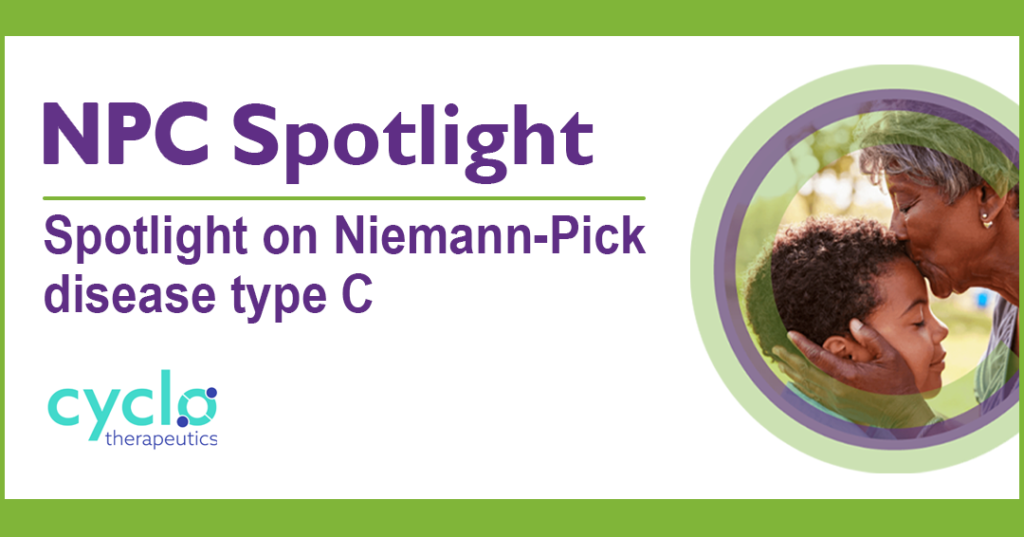 Cyclo Therapeutics’s NPCSpotlight.com is a web resource dedicated to Niemann-Pick type C. This website includes helpful information and resources for NPC patients and families, as well as information and updates on their TransportNPC clinical trial. Check out the NPC Community page to read shared journeys from JP Honsinger and Dee & Dan Reynolds.
Cyclo Therapeutics’s NPCSpotlight.com is a web resource dedicated to Niemann-Pick type C. This website includes helpful information and resources for NPC patients and families, as well as information and updates on their TransportNPC clinical trial. Check out the NPC Community page to read shared journeys from JP Honsinger and Dee & Dan Reynolds.
Adult Onset Niemann-Pick type C (NPC)
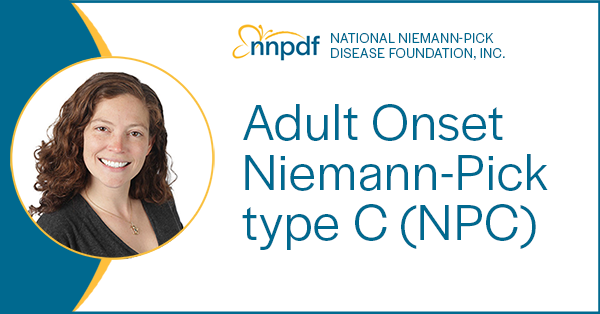 Symptoms of Niemann-Pick disease type C (NPC) can vary widely. In many cases symptoms first appear early in life. However, for a subset of patients who have adolescent/adult-onset NPC, symptoms might not appear until much later. In efforts to help patients and caregivers manage NPC and access the support they need; it is important to understand some key issues related to adult-onset NPC.
Symptoms of Niemann-Pick disease type C (NPC) can vary widely. In many cases symptoms first appear early in life. However, for a subset of patients who have adolescent/adult-onset NPC, symptoms might not appear until much later. In efforts to help patients and caregivers manage NPC and access the support they need; it is important to understand some key issues related to adult-onset NPC.
Symptoms
In infancy and childhood, NPC most often presents through physical symptoms such as yellowing of the skin or enlarged liver or spleen. In adult-onset NPC, however, many patients first experience neurological symptoms. These symptoms can lead to difficulties with coordination such as walking, eating, and talking and difficulties looking in a vertical direction. In many cases, people living with adult-onset NPC are first considered to have a mental health condition such as schizophrenia or manic-depressive or bipolar disorders. The differences in symptoms between children and adults can make adult-onset NPC very difficult to diagnose; many patients seek medical care for years before receiving an accurate diagnosis. By raising greater awareness of the symptoms of adult-onset NPC, we can help more patients and families to access the appropriate care they need as quickly as possible.
Support
While living with a rare disease can be difficult for anyone, people and families of adults living with NPC can face severe challenges that affect their emotional and mental well-being. Before symptoms appear, many people living with adult-onset NPC appear relatively healthy and are able to take part in daily activities including exercise, socializing, working and caring for their families. The onset of symptoms, however, can mean that patients decline and lose the ability to work and care for themselves or their families. Symptoms can also lead to emotional challenges and feelings of confusion and frustration. In developing a care program, it is often essential to help patients take steps to manage both their physical and emotional symptoms.
In providing support, it can often be helpful for patients and caregivers to hear from other individuals and families affected by adult-onset NPC. NNPDF board member Cara Gilmore was diagnosed with adult-onset NPC in September of 2019 and is involved in many different efforts to help patients connect to share information. She has participated in media interviews and works with physicians and advocacy groups across the country to help raise awareness. To learn more about her story or to connect with Cara, please visit the resources below.
- Adult-Onset Niemann-Pick Disease: A Diagnostic Journey
- A Message from Cara Gilmore
- Email Cara at: nnpdf@nnpdf.org
NNPDF Resources
NNPDF is dedicated to supporting all people who are living with NPC. We are committed to building broader awareness of adult-onset NPC in both the medical community and among the public. By doing so, we can help more people obtain an accurate diagnosis sooner and then help them get the treatment and support they need. If you or someone you know has started experiencing symptoms, we have a range of resources that can help, including information to help you find a doctor as well as options for financial support. If you have been recently diagnosed with adult-onset NPC, there are also many wonderful individuals and families who work with NNPDF to share advice and support as you navigate this journey.
Our annual Family and Medical Conference is a perfect opportunity to meet with other patients and families who understand the challenges of living with adult-onset NPC and who can share helpful information or just be there to listen. For more information on our conference, please visit this link. At NNPDF we are also continuously working to support research that can lead to new treatment options for people impacted by NPC at any age and we are continually working to expand the resources and services we have to help. For information visit our website or contact us directly at familyservices@nnpdf.org. We are here to help.
Newborn Screening Update
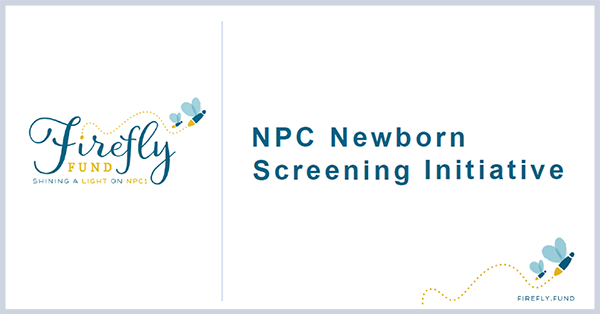
Community Activities and Research to Add Niemann-Pick Disease to Newborn Screening Lists Continues
Niemann Pick Type C
Community Activities and Research to add NPC to Newborn Screening lists at the state and federal level in the United States continues to advance in 2022. Please find a summary of these activities below. Additionally, the International Niemann-Pick Disease Alliance has launched a newborn screening initiative with the goal of building an international road map for ensuring that NPC is added to newborn screening lists around the world, where applicable.
- ScreenPlus is underway in New York with active recruitment at one NY hospital and an additional eight NY hospitals set to begin recruitment as early as this summer. The three major goals of the pilot study are (1) define the analytic and clinical validity of multi-tiered screening assays for 14 disorders, including NPC; (2) determine disease incidence in an ethnically diverse population; and (3) assess the impact of early diagnosis and treatment on health outcomes through the use of longitudinally collected clinical, biomarker, radiographic, and biochemical data. The addition of the remaining hospitals in NY will be an important step towards screening the volume of patients needed for inclusion on newborn screening lists. The ScreenPlus team is working tirelessly to ramp-up, despite the continuing limitations posed by COVID19. You can learn more about ScreenPlus here.
- All Stripes is conducting a study of siblings diagnosed with NPC comparing outcomes for siblings diagnosed at different stages of disease progression and intervention. NPC families in the U.S., Canada and the U.K. are welcome to join the AllStripes program to stay updated and be part of future projects. AllStripes does the work to collect your records and make them accessible in your secure account, at no cost. The goal of the study is to have at least 80 NPC patients participating and to date 64 families have enrolled. If you haven’t already, please take a moment to join the AllStripes study here and contribute to this NPC research project without leaving home.
- Clinical Roundtable NPC clinical experts working to align on key issues such as timing for treatment initiation; measuring disease progression, and the role and value of natural history data. Members of the Clinical Roundtable, led by Drs. Berry-Kravis and Patterson, are working on an update to NPC clinical guidelines that will focus on the importance of early diagnosis and intervention in Niemann-Pick Type C.
Community members will hear updates from researchers related to these important newborn screening activities and advancements for Niemann-Pick Disease at the upcoming 2022 Michael, Marcia and Christa Parseghian Scientific Conference in Tucson, Arizona, May 21-24, the National Niemann-Pick Disease Foundation Annual Family and Medical Conference in Orlando, Florida, July 28-30, and the International Niemann-Pick Disease Alliance Annual Meeting in Orlando, Florida, July 29-August 1.
Fundraising
 Contributions through fundraising by NNPDF members, families and friends are used to provide services and information to individuals and families affected by NPD, as well as supporting research into finding treatments. Please continue to host and support NPD fundraisers. Awareness Events promote awareness to the general public about Niemann-Pick Disease.
Contributions through fundraising by NNPDF members, families and friends are used to provide services and information to individuals and families affected by NPD, as well as supporting research into finding treatments. Please continue to host and support NPD fundraisers. Awareness Events promote awareness to the general public about Niemann-Pick Disease.
If you have recently hosted a fundraising event, send us your photos and we’ll share them and details from your event in upcoming newsletters!

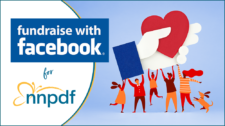 THANK YOU to Kim O’Riley Lucht, Dani Ganter, and Alyssa Gallegos who recently hosted Facebook Fundraisers for the NNPDF! We truly appreciate your support!
THANK YOU to Kim O’Riley Lucht, Dani Ganter, and Alyssa Gallegos who recently hosted Facebook Fundraisers for the NNPDF! We truly appreciate your support!
Want to host your own Facebook Fundraiser? It’s easy! Visit facebook.com/fund/NNPDF to get started!
Surveys, Studies & Market Research
Be sure to check out our Surveys & Market Research webpage for current survey and study opportunities in the Niemann-Pick disease space. Participating in surveys and studies is important to the advancement of health options for our Niemann-Pick community members. Current surveys and studies are listed below. Contact Laurie Turner at familyservices@nnpdf.org for any questions.
Duke-Margolis NPC Public Workshop Update
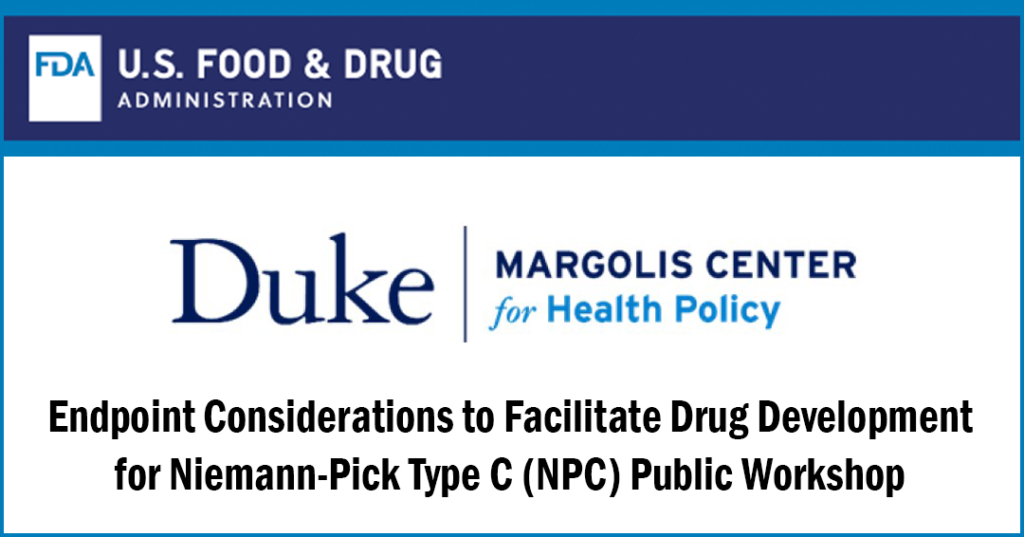
A public workshop was previously held by Duke-Margolis Center for Health Policy, sponsored by the FDA. This virtual public workshop allowed participants the opportunity to discuss clinical endpoints relevant to NPC clinical trials and innovative strategies to support therapeutic development for patients with NPC.
Following this workshop, NNPDF submitted a letter and supporting materials to the FDA and Duke Margolis Center for Health Policy in response to the docket. We are currently awaiting the Summary Document from this workshop which we will share widely once it is available.
Clinical Trial Updates
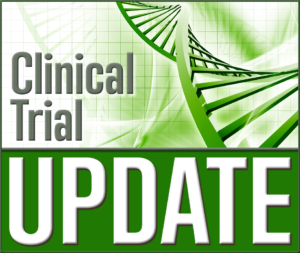
Clinical trials are currently in progress to study and develop treatments for ASMD and NPC. The NNPDF posts new information regarding clinical trial updates as soon as it is received. Visit our Clinical Trials web page for up to date information on all clinical trials.
NNPDF Membership
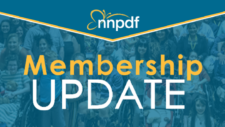 Enrolling, confirming, or updating your membership will ensure we have accurate information for you and your family. This will help us to continue to provide you with important notifications and updates from the NNPDF.
Enrolling, confirming, or updating your membership will ensure we have accurate information for you and your family. This will help us to continue to provide you with important notifications and updates from the NNPDF.
Click here to update or enroll today!
For assistance contact Laurie at familyservices@nnpdf.org or call 920-542-4038
Emergency Hardship Program
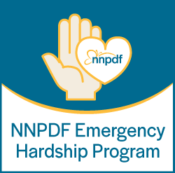 The NNPDF Emergency Hardship Program continues to offer assistance to qualified NNPDF U.S. member families facing a crisis. Funding includes but is not limited to, specialized medical equipment, durable medical goods, utility bills (heating and cooling, electricity, phone, water and sewer), home and car repairs, and bereavement expenses. Click here for complete details and eligibility information.
The NNPDF Emergency Hardship Program continues to offer assistance to qualified NNPDF U.S. member families facing a crisis. Funding includes but is not limited to, specialized medical equipment, durable medical goods, utility bills (heating and cooling, electricity, phone, water and sewer), home and car repairs, and bereavement expenses. Click here for complete details and eligibility information.
Please contact Laurie Turner, Family Services Manager at 920-542-4038 or familyservices@nnpdf.org if you have any questions about this program.

